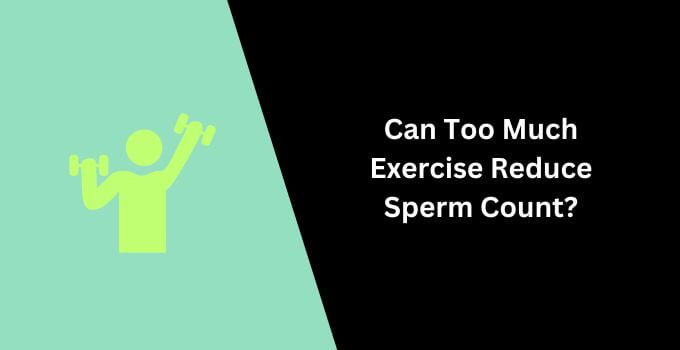Have you ever considered that your rigorous workout routine might be doing more than just sculpting your muscles?
As someone who pays close attention to their health, you’re likely aware of the many benefits of regular exercise. However, when it comes to fertility, the balance between physical fitness and reproductive health isn’t always straightforward.
Recent studies suggest that while moderate exercise can be beneficial, an excess might lead to a decline in sperm quality, including reduced sperm count. You’re probably wondering how much is too much and what types of exercise could tip the scales against your reproductive favor.
To unravel this complex relationship, it’s essential to examine the scientific evidence that links strenuous physical activity with male fertility indicators. Join the discussion to uncover the threshold where beneficial exercise potentially becomes a counterproductive force against your sperm count, and what you can do to maintain both your fitness and fertility.
Why strenuous exercise affects Sperm Quality in Male?
Strenuous exercise can lead to a decrease in sperm quality due to factors like increased testicular heat and hormonal imbalances. Intense physical activity, especially activities such as cycling, may elevate testicular temperature and disrupt the delicate hormonal milieu necessary for sperm production. This imbalance can result in a reduced sperm count and alterations in sperm motility and morphology.
Moreover, over-exertion can trigger oxidative stress and chronic inflammation, undermining sperm health and overall fertility. To protect and serve the reproductive well-being of those you care for, it’s crucial to promote a balance between moderate and intense exercise, mitigating the impact on sperm and ensuring the best chance for reproductive success.
Observational and Intervention Studies
Building on the understanding of how intense exercise might affect sperm quality, let’s examine what observational and intervention studies have revealed about this link. You’ll find that these studies serve as crucial sources of information, helping to guide individuals who aim to maintain both their fitness and reproductive health.
| Study Type | Focus Area | Key Findings |
|---|---|---|
| Observational Studies | Physical activity and semen | Associations between exercise and sperm count |
| Intervention Studies | Reduced semen quality | Direct effects of exercise interventions |
| Observational Studies | Sperm counts | Potential negative effects of intense exercise |
| Intervention Studies | Impact of exercise on fertility | Testing specific exercise regimens |
| Combined Insights | Overall effects on reproductive health | Comprehensive understanding of exercise’s impact |
High-Intensity Sports Risks
When engaging in high-intensity sports, it’s important to consider that such rigorous training can significantly alter semen parameters and, in turn, may impact fertility. You’re serving your body by staying active, but remember, the high-intensity sports risks to male fertility are real. Intense exercise can affect semen concentration, motility, and morphology, all vital for maintaining healthy sperm count and quality.
Tight clothing and prolonged heat exposure, common in activities like cycling, GYM may raise scrotal temperatures, hindering sperm production. Moreover, exhaustive workouts can disrupt hormone balances, influencing the hypothalamo-pituitary-gonadal axis. This axis is crucial for reproductive function.
To safeguard your fertility, finding a balance in your exercise routine is key. It’s about providing care to your body without compromising semen quality.
How to avoid the low count sperm risk?
To safeguard your fertility, opt for moderate workouts over extreme fitness regimes to prevent a potential decline in sperm count. Remember, your ability to help others starts with taking care of yourself.
Choose loose-fitting underwear and steer clear of tight training shorts to maintain a cooler environment conducive to sperm production. Your lifestyle choices, including a balanced diet and weight management, play a crucial role in preserving your sperm count.
If you’re dedicated to serving others, ensure you’re also committed to a balanced exercise routine and seek medical advice for any fertility concerns. Embrace a healthy lifestyle, minimize alcohol intake, quit smoking, and wear protective gear during sports. These steps are key to maintaining your fertility and your capacity to contribute positively to the lives of others.
Best For: Individuals seeking to improve their reproductive health and reduce the risk of low sperm count through lifestyle adjustments.
Pros:
- Encourages a healthier lifestyle that can improve overall well-being.
- May increase the chances of conception by optimizing sperm health.
- Provides a variety of strategies that are simple to implement in daily life.
Cons:
- Some recommendations may require significant lifestyle changes that could be challenging for certain individuals.
How to Improve Male Fertility?
Improving male fertility often starts with incorporating regular, moderate exercise and a balanced diet into your routine. You’ll want to maintain a healthy weight and avoid lifestyle habits that can impede sperm quality, such as excessive alcohol consumption and smoking. It’s also wise to wear protective gear during sports.
If you’ve been trying to conceive without success, a fertility specialist can provide a semen analysis to identify any underlying issues with male infertility. Effective fertility treatment might be an option. Below is a helpful table for quick reference:
| Lifestyle Change | Benefit for Fertility |
|---|---|
| Regular, Moderate Exercise | Enhances sperm quality |
| Nutritious, Balanced Diet | Supports overall sperm health |
| Consultation with Specialist | Tailored fertility treatment |
Conclusion
You’ve pushed your body to the limit, but at what cost? Imagine your vitality, like sand slipping through fingers, with every extra mile, every unyielded sprint.
Don’t let your zeal for fitness eclipse the deeper desire for a legacy. It’s time to recalibrate, to find that perfect harmony between peak fitness and fertility.
Ease off the throttle—your future as a parent may depend on the balance you strike today. Will you heed the call for moderation?
Affiliate Disclosure: Some of the links in this post are affiliate links, which means I may earn a small commission if you make a purchase through those links. This comes at no extra cost to you. Thank you for your support!



